Points of Entry: Writers on the Border
PEN America members are sharing reflections on the crisis surrounding the treatment of immigrants, asylum seekers, and those living in the United States without documentation. As we learn more about the conditions in immigration detention centers and as the federal government threatens mass deportations, these writers give expression to the sadness, anger, and despair engendered by the experiences of those seeking sanctuary in our country.
Click to jump to: Julia Alvarez • Joseph Bruchac • Rocío Carlos • Tina Chang • Alex Espinoza • Hari Kondabolu • Hari Kunzru • Jhumpa Lahiri • Paul Muldoon • Idra Novey • Ladan Osman • Lara Prescott • Carolina Rivera Escamilla • Ingrid Rojas Contreras • Fatima Shaik • Andrew Solomon • Monique Truong • Victor Vazquez • Sholeh Wolpé
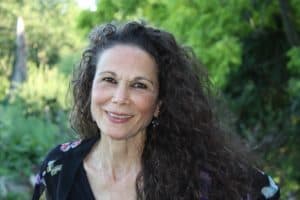
Photo by Bill Eichner
Julia Alvarez, poet and novelist
“Saving the Children”
Every day they were trapped, we checked in
with the nightly news to hear how
the Wild Boars were doing. A boot camp
had been set up at the mouth of the cave
after two divers discovered the boys
and their coach perched on a rocky ledge,
licking the walls for water, edging away
from the questioning sweep of the camera
as if afraid of exposure to the light
of the divers’ flashlights, then bowing
in gratitude, their thin limbs,
reminiscent of children in newsreels
from the liberated camps.
We listened for updates:
volunteers pouring in—an Aussie doctor
stayed with them, checking their hearts,
their lungs, the ambient oxygen; a Danish
spelunker cut short his vacation to map
the underground labyrinth; a billionaire
built a mini submarine to float them out
of the narrow birth-canal-type tunnels;
ministers offered prayers, rescuers their lives
(one taken in earnest)—everyone working
together to get the Wild Boars out
before the rains fell and the waters rose.
But before we could switch
channels and savor the jubilation
of watching them saved from the worst
that could happen, trotted out of the cave,
wrapped in tin foil like baked potatoes
and rushed under golf umbrellas
to the thunderous sound of a downpour
of clapping into the waiting helicopters,
their mothers, aunties, grandmothers already
readying the meals the boys had requested—
fried rice with crispy pork, spicy chicken—
we heard the crying
of children ushered into chain-link
enclosures, calling for their mothers,
their fathers, the wrenching look
of a toddler glancing up at the face
of a stranger speaking a language
she didn’t understand—
And we didn’t understand
how this could happen: on the one hand,
saving the children, on the other hand,
wresting them from their parents,
as if we live in a zero sum world
where something has to be taken away
if something is put back together,
happiness being the give of a rope
that goes taut somewhere else—
where a body hangs limp
from the branch where the lynch mob
has strung it.
It must be the fault
of such cruel mathematics, for how
else to understand this strange
disconnect, as if a part of us
we didn’t know we had lost
in the fear-filled caverns of the heart—
the selves we discovered we could be
when we saved the Wild Boars—
were calling to us in the voices
of terrified toddlers,
in danger of being drowned out,
as the waters keep rising.
Copyright © 2019 by Julia Alvarez. All rights reserved. First published in The Nation, February 7, 2019.
Joseph Bruchac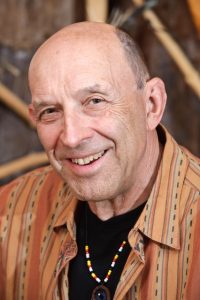 , poet, novelist, and short story writer
, poet, novelist, and short story writer
“Kulipaio”
A few months ago my son Jesse and I did a song-writing workshop in an elementary school near the Canadian border.
One of the second graders raised a hand. “How do you say ‘You are welcome here’ in Abenaki?”
“Kulipaio,” Jesse answered.
“Can that be the name of our song?” another child asked.
Before long, lines were coming from all the kids, composing a song their class performed in the Friday assembly.
All are welcome here, all are welcome here, kulipaio
You are welcome here, coming over the border,
You are welcome here, coming in a plane
All are welcome here, kulipaio.
What does that innocent lyric have to do with the current crisis at our southern border, where children are being separated from parents and immigrants in search of nothing more than survival are dying because of current government policies?
Everything.
I’ve been told by my Native elders that the two most important things to practice are being thankful and sharing. We’re a nation of incredible wealth, fearfully wasting money on “defense” policies that make us less safe. Leaders whose forebears came here from other countries—and were welcomed by my own indigenous ancestors—now want to lock out those in need.
Open borders might not work, but open hearts would be a start. Provide generous, well-planned aid to those Central American nations people are fleeing so they don’t have to leave. Use rather than abuse immigrants who can provide needed hands to our work force. See other people as fellow human beings, not enemies. And don’t put the Good Samaritan in jail for helping someone dying of thirst.
Until we can see the world as wisely and optimistically as those second graders, we’re going to fail—focused on fixing a leaky roof while the foundation is being washed away.
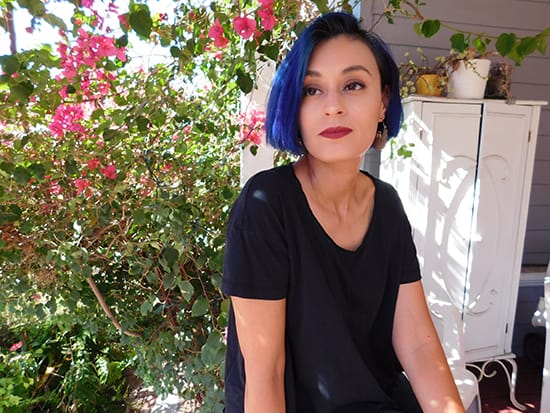
Rocío Carlos, author (the other house) and 2003 Emerging Voices Fellow
“Survivor’s Remorse”
I cannot reflect upon the current horror of detained and violated children without seeing a version of my life playing out. A version in which my parents did not come back after being rounded up, detained, deported or denied entry, which they were, both of them, separately. A version in which there was not an amnesty for which they qualified and could afford to submit paperwork. A version in which I did not emerge their spotless American child, perfect english in my mouth, tall and stubborn and shoving my way to the front of the line with my little sister in tow.
I know that the parents of these children wanted for them to be unsullied by the crossing. They meant for the burden to be theirs alone and for their children to be concerned only with school and playmates and making their parents’ proud. They hoped the children would forget. yet it is memory which both keeps them reaching for each other and trying to forget.
*
This is not your burden, or your story.
We crossed, we carried you, folded
like a damp leaf under our tongues.
We put good shoes on your feet
and pushed you away from the names
we gave you. Why do you want
to remember that fence, that desert.
Because the desert left its shadow on me,
it calls me its own child. I go outside and my
own name rises to the surface of my skin to remind me
I was ferried across a dried sea full of graves.
Because every fence of the place you have brought me to,
I grew too tall for. Because the thing you gave me, in spite of yourselves,
is memory, and the language with which to map it.
Tina Chang , poet (Hybrida and others)
, poet (Hybrida and others)
We have come to a profoundly alarming moment in American history where a chosen president has made it abundantly clear that his fear, racism, insecurity, and shortsightedness has forced him to view only walls and isolation as a solution to his inner turmoil. Trump’s “zero tolerance” policy has separated migrant families, caused irreversible trauma, increased human trafficking, and has caused deaths to those who seek refuge from dangerous situations in their homeland as they risk an uncertain future to save the lives of their families. The current administration has demonstrated a lack of understanding about the value of human lives and the foundation of American democracy.
What history shows us is that for every action, there is a reaction. For every family that is separated at the border, there will be a child who grows up to thirst for freedom. For every death we bear witness to, there will be a life that persists despite devastating hardship to fight for what he/she/they deem to be their inalienable right to safety and asylum. For every wall, for every government campaign for borders, there will be a sea of people coming to our doorway—however closed, however barricaded—they will arrive as we all arrived long ago. With all the graves that Trump has dug in his imagination, there will be legions of mindful, intelligent, powerful, multilingual, colored, othered, beautiful migrants who will push past these most temporary ideas because hate is very shortsighted. Blood runs dry. Collective humanity will emerge from wreckage, and this administration and its harmful policies and limited language will become extinct. What blossoms after this will be our American truth.
Alex Espinoza, author (Cruising: An Intimate History of a Radical Pastime and others) and Emerging Voices Fellowship prose master class instructor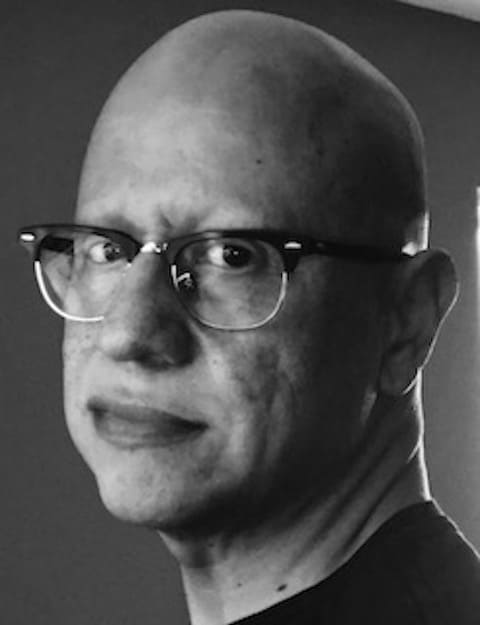
On my way up Highway 395, up the eastern spine of California, I drove past the towering jagged peaks of the Sierra Nevada mountain chain, marveling at the sight of snow streaking their sides while my air conditioner fought to keep me cool against the 91 degree heat outside. Along the windswept road, as trucks and semis barreled past, I saw the sign written there in bright white letters: MANZANAR.
I thought about our country’s constant urge to lock up, to incarcerate, to imprison anyone they deem a “threat.” It made me think of my mother, of the sacrifices she made long ago when she crossed the border into the United States to meet up with my father when he worked in California illegally. I wondered what would have happened to her had she been met by ICE agents who would take her children from her, lock them up, separate her from them for days or months.
She would have been fucking pissed, I thought. My mother was never, ever one to give in to such brutal tactics. She would have rather died.
I come from a people who never could sit still, a people who move and reach out. Borders for us simply don’t exist. We don’t see the world that way. My mother taught us to ignore boundaries and lines. This is what I think is so absurd about what is happening right now on our border. No government or laws can keep us from it.
As long as there are mothers yearning to give their children a fighting chance, we’ll keep coming. Xenophobic laws won’t impede us. Borders won’t stop us. Cages won’t keep us. They just won’t.
Hari Kondabolu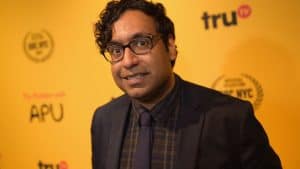 , comedian, filmmaker, and podcast host
, comedian, filmmaker, and podcast host
What is happening at our Southern border is a crime against humanity. There are those who claim this is not about immigration, but “illegal immigration.” Do not believe the false narrative that what we see is simply an enforcement of our immigration laws. No, this is about controlling the population and slowing down the “browning” of America. What we are seeing is racist and the sight of brown children in cages, separated from their families, should make this fact abundantly clear. (Apparently, we like our Canadians “cage free.”) These children are the prisoners of a war on immigration. Despite the fact this was a country fundamentally shaped by immigrants (with and without documents), this truth is ignored because of racism and fear masquerading as law enforcement. America rejecting immigrants is like a body rejecting its own blood.
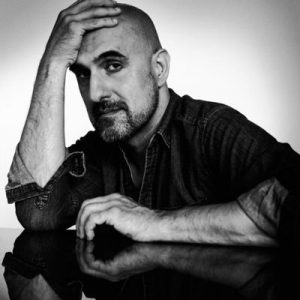 Hari Kunzru, novelist (White Tears and others)
Hari Kunzru, novelist (White Tears and others)
America finds itself at a crossroads. How we respond to the manufactured migration ‘crisis’ on the southern border will determine the future course of domestic politics, and will have global repercussions. At stake is a core principle which has defined the post Second World War international order. Do we accept, as the preamble to the Universal Declaration of Human Rights puts it, that “recognition of the inherent dignity and of the equal and inalienable rights of all members of the human family is the foundation of freedom, justice and peace in the world”? If so, then the treatment of migrants on the southern border is not only despicable, but a crime that strikes at our authority to fight human rights abuses, up to and including genocide, around the world.
The explicit political aim of many who support the Trumpist border regime is to destroy the belief that humanity has a shared dignity and a common destiny. They wish to restrict rights to citizens, and open the way for non-citizens to be treated as non-persons, ‘illegals’ who are less than fully human, and to whom nothing is owed. ‘We’, the fully human, would experience terrible pain if our children were taken from us and put in camps, to be abused and neglected by their captors. They, the lesser ones, have only themselves to blame.
If we are honest, we will look at the causes of the flow of migrants toward the southern border, which include political unrest, endemic social violence, and climate change, and see that no wall can solve them. No border regime, however harsh or spectacular in its violence, will alter the terrible calculation that migrants are making. If the U.S. does not close down its archipelago of camps, and institute a policy that respects human dignity and takes account of the actual conditions in the world, future historians will wonder how so many stood by and did nothing while the most powerful nation on earth slid into barbarism.
 Jhumpa Lahiri, Pulitzer Prize and PEN/Hemingway-winning novelist and translator
Jhumpa Lahiri, Pulitzer Prize and PEN/Hemingway-winning novelist and translator
The arrest on June 29 of Carola Rackete, captain of the NGO rescue vessel Sea Watch 3, is now front-page news in Italy. Her crime was to bring migrants in imminent danger into the port of Lampedusa against the specific orders of the Italian government. She will likely be charged with the crime of saving lives. This case caps a year I have spent living in Italy and watching, with increasing outrage, the abhorrent treatment of desperate individuals fleeing war and desolation and arriving, if so fortunate, in a country now dense with hatred and hostility toward migrants. As I write this, I am packing my bags to return to America, where humanitarian volunteer Scott Warren was tried, also in June, for providing water and food to migrants crossing the desert in Southern Arizona. As I write this, I am watching my husband and daughter swim together in the same Mediterranean in which, this year alone, over three hundred people have drowned off the shores of Italy and Malta. I can’t help but think of another father and daughter, Salvadoran Óscar Alberto Martínez Ramírez and Valeria—she was one month short of her second birthday—photographed face down in the mud. They died in late June attempting to swim across the Rio Grande into Texas. As every school child in America knows, the United States is a country in large part founded by immigrants and refugees, with the labor of slaves, on land taken by Native Americans. There is a beautiful statue in New York Harbor that celebrates the brave journey immigrants made. Italy, too, seems to have re-pressed its own migrant history. Like America, it currently aims to barricade its borders and perceives those crossing them as a threat. I will observe this July Fourth in celebration of figures like Rackete and Warren, who put themselves at risk in order to help the most vulnerable among us, who insist upon the human rights of those yearning to breathe free.
 Paul Muldoon, poet, winner of the Pulitzer and T. S. Eliot prizes, and PEN America Trustee
Paul Muldoon, poet, winner of the Pulitzer and T. S. Eliot prizes, and PEN America Trustee
“These Children Kept in Cages”
These children kept in cages like so many geese
in whom a sense of powerlessness is quite powerfully ingrained
have now made us the villains of the piece
that runs without an intermission. Wonders will never cease
yet the policy under which we’ve all but chained
these children, kept in cages like so many geese,
must be axed. The glory that was Greece
has faded. The rats who argued for their swamp being drained
have now made us the villains of the piece
and inoculated us against the Mathers, Cotton and Increase,
against a homespun sense of humanity that has nonetheless reigned.
These children kept in cages like so many geese
and, like geese, wishing merely to take comfort in a downy fleece
and find themselves not countered but counterpaned,
have now made us the villains of the piece
as if our camps were organized by the North Vietnamese.
We’ve undermined such moral high ground as we had once gained.
These children kept in cages like so many geese
are, at the very least, a disturbance of our peace.
The views of our President, whose ignorance at first seemed feigned,
have made us now the villains of the piece
since every open palm’s mostly a palm to grease.
They’re living better than ever, our President’s maintained,
these children kept in cages. Like so many geese,
they represent the thin end of a wedge. The same caprice-
constant forces that made relations between tectonic plates so strained
have now made us fractured. The villains of the piece
should be that President, his consensual Congress, those border police
throwing up their hands and showing them to be blood-stained.
These children kept in cages like so many geese
are crying out less for their release
than ours . . . From our own center. From where we, too, are detained.
These children kept in cages like so many geese
have now made us the villains of the piece.
 Idra Novey, author (Those Who Knew) and translator
Idra Novey, author (Those Who Knew) and translator
Our country is not full.
It is not a six-table restaurant.
It is not a four-seat golf cart.
According to the 2010 Census, forty percent of the continental United States remains unoccupied.
In the state of Indiana alone, there are thirty-nine towns with no one living in them.
Nebraska has just as many empty towns and Nebraskan farms are struggling to find enough workers.
Because our country is not full.
The country was not full in 1939 when a boat carrying Jewish passengers was refused entry and forced to return to Europe, where a third of the passengers were murdered.
“The line must be drawn somewhere,” said immigration minister Frederick Blair in 1939.
“Beyond this line,” asylum seekers are told in 2019, “there is no room for you.”
But this country has room.
Because no country is a stomach.
No country is a bladder that will burst.
There is no line that “must be drawn” along any border, forcing refugees to return to places where they will die.
Our country is not full.
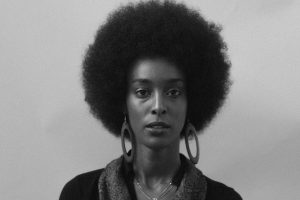
Photo Courtesy of Blue Flower Arts
Ladan Osman, poet (Exiles of Eden)
At Times Square the lights are on all of the time. I watch parents: how they grip shins dangling over their shoulders; clap little hands between theirs; say no; say yes; brace for a flash or blink after it; how they grip shoulders in the crowds that form around counterfeit Mickey Mouse and Cookie Monster, those unauthorized figures with matted hair. I concentrate to make an argument for joy: We should pretend to be happy no matter what, for the children, for whom holidays, just like the rest of world, are giant. But then, most children held in detention were expected, expectant, U.S. phone numbers written onto things their parents thought they wouldn’t lose, when they believed their children wouldn’t be taken altogether. On Twitter, someone is angry a neighbor stole their package. “The audacity,” a friend comments.
On the train, a man alternately sings and begs. He says to the air: “Today was my birthday. Where were you?” I imagine children in detention address the air, too on their birthdays, when needing instruction: babysitting fellow detainees, starting a period, or, when dying. He gives me an extended middle finger. Something about how I’m not from here, something about going home. A girl obscures her ungovernable face with sunglasses and smiles at me.
Days later, as July 4th cookouts end, a neighbor launches firecrackers from a squat liquor bottle. I’m at a deli where a man who wants more pepperoni on his roll thinks the owners are calling 911. “No one called the police on y’all on 9/11,” he says. “Fuck immigrants. We’re all wearing red, white, and blue.” Strangers jeer. When I was a kid, I’d laugh at racism, its absurdity, its grotesque irreverence. Now, I may smile tight like my father when he’d say: “You laugh daughter but I cannot.” The owners are behind plexiglass, a desired cage over the doorway. Other people’s children hear this too, may guess that it never stops: Speak English. It’s a command, a curse, a spell with many intentions.
Lara Prescott , novelist (The Secrets We Kept)
, novelist (The Secrets We Kept)
As we stand on the street and watch the parade pass by, as we take off our hats and place our hands over our hearts, as the fireworks light up the night sky, many of us this year will take a moment to think of those left in the darkness.
Right now, an eight-hour and six-minute drive from where I live in Austin, Texas, there are over 100 children being detained at the Clint Border Facility.
Toothbrushes are not provided. Few are allowed to shower. Toilets are dirty and sinks lack running water. Most children have not been bathed and wear filthy clothes.
“Never before in my life have I witnessed, heard of, or smelled such degradation and inhumane treatment of children in federal immigration custody,” one June report concluded.
Many detention facilities dot our southern border; all this is happening at just one. All told, thousands of children are detained, without their parents; at least seven have died since last year—that we know of.
This year, as we celebrate a day off of work with sparklers and hot dogs, many among us will question who is responsible. Millions will ask why journalists are being denied entry to document these facilities. We’ll wonder why donations of diapers, clothing, medicine, games, and food are being turned away. And as we hold our hands over our hearts this holiday, so many of us, on every street in every city—our friends and neighbors, our colleagues and families—will do so knowing our government has failed to meet its promise of keeping America the land of the free and the home of the brave.
Carolina Rivera Escamilla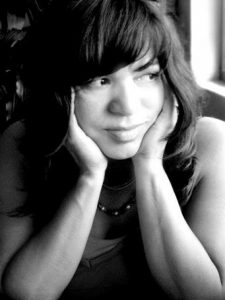 , educator, writer, and 2002 PEN America Emerging Voices Fellow
, educator, writer, and 2002 PEN America Emerging Voices Fellow
It would be easy for me to list the sufferings of the immigrant caravans, to decry the abusive treatment of children in detention camps, or to describe the killings and lost lives crossing borders from Guatemala to Mexico to the USA. However, making readers sad or angry, or writing about the young Salvadoran father, Oscar Martinez and his toddler daughter, Angie Valeria, who drowned in El Rio Bravo, or about the surviving wife and mother, Tania. The refugee situation may not remain here; it is already moving far ahead of the mere conjuring of human emotions. In my opinion, it is time for U.S. persons to face and understand the fuller historical situation that continuously creates dire realities for immigrants from the so-called Banana Republics that the USA contrived in Central America.
Salvadorans lived firsthand the history of the 1980s, marked by outright civil war, (1980-1992) which the U.S. financed and fueled under a fanatically anti-communist regime, that got the U.S. fully involved in the Salvadoran conflict, and throughout the region. More than half a million Salvadorans arrived in the USA between 1979 and 1992. Even though the conflict ended, Salvadorans continued to emigrate with hope of achieving their own vision of an “American Dream.” During the post-war period emerged a generalized label of “Las Maras” or gangs, an unforeseen development in the USA of disaffected refugee adolescents subsequently deported to El Salvador beginning in the late 1990s, early 2000s.
My dream is that: persons responsible for human rights legal violations be prosecuted for what they inflicted/inflict on El Salvador and Central America, we all see a dawn when no one needs to flee home and community, and we decriminalize crossing borders for escaping poverty and violence via required respect for human rights as the law of all nations.
Ingrid Rojas Contreras , novelist (Fruit of the Drunken Tree and others)
, novelist (Fruit of the Drunken Tree and others)
We live in a country that believes in the right to life but only for the anointed, and so we are still unsure about whether a boy standing on Mexican soil who is unjustly and mortally shot by a border patrol officer standing on United States soil deserves justice.
We live in a country that believes in freedom but only for the anointed, and so we interpret asylum seekers’ right to remain in the United States while their claim for protection is pending to mean that we have the right to jail them.
We live in a country that believes human rights are not for everyone, so we feel free to disband families, inject our asylum seekers with psychotropic drugs, put children in the care of other children, resist the idea that asylum seekers have the right to sanitation.
This is Jim Crow country, Native American genocide country, Japanese-internment country.
In our freezers we retraumatize our would-be refugees, priming them with indifference and violence as they wait for their hearing date, where we tell them they will finally get the chance to convince an officer that theirs is a fear that is credible. This is a country of laws, we tell them. This is a country that provides the anointed with laws, we don’t tell them.
Let this to be a country that anoints asylum seekers with more rights than the right to remain, and the right to a hearing. Let this be a country that remembers that the line is imaginary, that even the Rio Grande redraws the border each time it grows and recedes.
Fatima Shaik, author 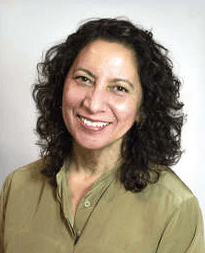 (What Went Missing, What Got Found, and others), PEN America Trustee, and chair of the Children’s and Young Adult Book Authors committee
(What Went Missing, What Got Found, and others), PEN America Trustee, and chair of the Children’s and Young Adult Book Authors committee
“Haiku of Lost Dreams”
hard-natured cement
children without lullabies
learn instead about cold hearts.
“A Promise to Immigrant Children”
Words are not mothers.
Still, we writers, scream for you.
Stop thieves of parents!
“America on the 4th of July”
babbling pundits
children soaked in urine cry
unholy landscape
Andrew Solomon, 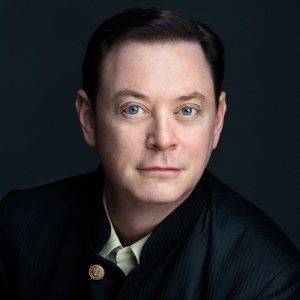 author (Far From the Tree, and others), former PEN America president, and current PEN America Trustee
author (Far From the Tree, and others), former PEN America president, and current PEN America Trustee
This idea reeks of groundless arrogance: that having happened to be born on one bit of soil entitles you to everything you would deny people born on another bit of soil. This idea stinks of injustice: that Americans across the board deserve prerogatives unknown to most of humanity. This idea is shocking and appalling: that anyone, anywhere, could think that the appropriate way to deter immigrants and asylum-seekers is deliberately to separate them from their children, placing those children in inhuman conditions. Family is sacrosanct; it is the one thing humankind holds in common. Whether rich or poor, American or foreign, white or of color, we have a small group of people to whom we are related, to whom we owe allegiance, and whom we tend to love. Family is our deepest responsibility: to care for and help one another. There is no greater cruelty than to deprive a parent of his or her child. The language of righteousness used in relation to this violation of human norms at the border is a malign and un-American rhetoric. “All men are created equal” was the opening gambit of these United States of America. Now such equality is under siege. Immigrants don’t come to the United States because it’s fun to do so; they come because they have run out of other options. They come full of hope, but also full of regret about the familiar world they have left behind. They come in abjection, and the responsibility of a country rife with privilege is to welcome them and lift them up. If we want fewer immigrants, we could help the poor of the world so that they don’t become so desperate as to flee their native lands. But even that would not absolve us of responsibility to those who come seeking solace at our gates. Yes, we should recognize that immigrants have built the America most of us love, but we don’t admit immigrants because they will get Nobel prizes and so bring glory to the USA; we admit them because those in the world who have owe a debt to those who have not.

Photo by Haruka Sakaguchi
Monique Truong, novelist (The Sweetest Fruits and others)
United States of America, I am losing faith in our shared vocabulary.
What is freedom and independence? What is land of the free and home of the brave? What is tired, poor, and huddled masses? What is united? Their agreed-upon meanings—hard-earned, hard-learned, and hard-scrabbled—are being gutted and, worse, replaced with chain migration, anchor babies, rapists, gang members, illegals, and our country is full.
United States of America, this Fourth of July I honor the unsung conjunction and, the true arrhythmic heart of our nation since its inception.
And, the stalwart, acknowledges our nation’s ambitions and shames: Pilgrims and parvenus. Settlers and dispossessors. Revolutionaries and slave owners. All men are created equal by their Creator and all men are not treated as equals by their Government.
And’s purpose is to join, no matter how complicated and contradictory the grouping of facts, ideas, and stories. And does not prioritize or take sides. And is neutral, which is not to say that it is amoral or incapable of judgment. And requires that we take a breath and take into account all that and has offered to us. And is meaningless alone, in isolation, and without context. And cannot perform its function without the words that precede and follow it. And requires others to be present. And by its very nature cannot exclude.
United States of America, we are living under the rising flag of or.
Or is the deliverer of conflicts, the conveyor contradistinctions. Or is the ascendency of irreconcilable differences, an efficient two-letter battle cry, posing as a question. Yes or no? With or against me? My rights or yours? Citizen or criminal? Or is a false flag. Or is a conjunction whose purpose is to divide.
Victor Vazquez,  author and 2014 PEN America Emerging Voices Fellow
author and 2014 PEN America Emerging Voices Fellow
Two years ago, my aunt finally told me the story about the day she and my mom crossed the border from Mexico to the United States as children. My mom was 11, and my aunt was a few years older when U.S. border officials detained them. That’s when my aunt lost my mother—and they were housed in a ‘camp’ along the border in separate tents, and for days they did not know where the other was.
My aunt wept as she recalled the story. “I screamed out her name every single day. I thought I lost her. I thought I lost my sister.”
That was over 50 years ago. She keeps that story within her.
This thing about concentration camps is not new. The southern border has always been a cracked space in a system which does very little to consider people as humans. But now we are seeing that space in its maximum monstrosity and the trauma—that trauma will play out in each of those thousands of lives for a lifetime and it will trickle into their families, and you will hear from another me, 50 years from now, how torturous this time was for their family.
Do you hear these stories?
It’s torturous to hear and see what’s happening. It’s overwhelming; I sometimes feel like I’m drowning. I can’t fathom what my people are going through right now along the border. I can’t fathom how many people are screaming out the names of their little sisters, brothers, mothers, fathers, sons, daughters . . . of those they love, of those they are losing to the failed promise of the United States of America.
 Sholeh Wolpé, poet, author, playwright (The Conference of the Birds, Keeping Time with Blue Hyacinths, and others)
Sholeh Wolpé, poet, author, playwright (The Conference of the Birds, Keeping Time with Blue Hyacinths, and others)
MAGA
America, think back to when you were great. To a time when you were seen as a beacon of hope. When your gates were open to immigrants who came and became you, the builders of a country that aspired to be a place for all.
How do you feel today, America? When children are separated from their parents and put in cages? When desperate people coming to you to escape violence and rape face torture and inhuman living conditions?
Who have you become America? Do you imagine that maintaining a good life requires stepping on human values, dignity and kindness? Those of you who take power from your faith, ask yourself, would Jesus extend his hand? Would Moses? What would they think of a Fourth of July celebrating tanks and bombs and sycophants in the front row? America, who have you become?
Who are we becoming? A totalitarian state like those from which many immigrants are fleeing? How much longer can this go on? Our American hearts bleed. The shining beacon of America has dimmed. Can we become great again?






